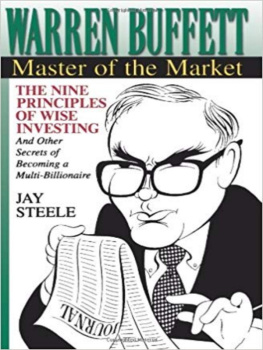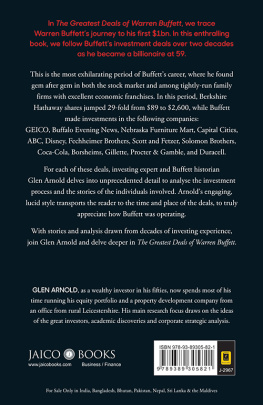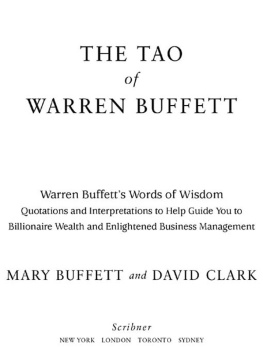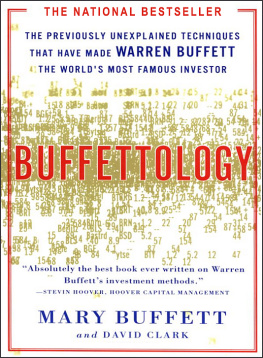
Warren Buffett
Master of the Market
Jay Steele
We are most grateful to Bruce Cassiday for his creative efforts in helping us to put this book together.
Contents
CHAPTER ONE
The Complete Investor
By the time he was thirty-one years of age, Warren Buffett was already a millionaire.
Twenty-one years later, in 1982, he was ranked Number 82 in the Forbes 400 list of wealthiest Americans. It was his breakthrough year on that list.
By 1983 he had jumped up to Number 31 by doubling his net worth to $520 million.
In 1985 he became a billionaire, worth some $1.07 billion, and was Number 12.
By 1986 he had worked his way up to Number 5 on the list and was included by U.S. News & World Report on a list of one hundred people and families who owned the biggest stakes in Americas publicly traded companies. There Buffett ranked eighth.
In 1989, with $4.2 billion, Buffett was Number 2 on the Forbes 400 list.
In 1993 Buffett finally reached Number 1, taking Bill Gatess position. With $8.3 billion, he was officially the richest man in America.
Among the most amazing things about this plainspoken, sometimes witty, always sharply intelligent man was the fact that he did it all on his own without a fat inheritance to stake him. He did it by the simple means of investing money in successful companies.
In several other ways Warren Buffett was an unfamiliar figure on the Forbes 400 list. For example, he did not take part directly in Wall Street maneuverings as most of his peers did. Instead, after a certain amount of exposure to Wall Street, he moved back home to Omaha, Nebraska, and from there did all his buying and selling.
For that matter, in physical appearance he did not resemble his peers, either. Nor did he act like his competitors on the Street. For whatever reason, he clung tightly to the image of a rather humble, even simple, Midwesternerhomespun, humorous, ever ready with an aphorism to illustrate his point, the Will Rogers of Wall Street.
After so many years of playing the homespun prophet, Warren Buffett had actually become that prophetand it hadnt hurt him one bit.
Honesty and integrity were the two most important elements in the mans character, according to one of his most trusted sources: himself, Warren Buffett. But it was not enough just to say that.
In Buffettese it came out this way:
Never lie under any circumstances. Dont pay any attention to the lawyers. If you start letting lawyers get into the picture, theyll basically tell you, Dont say anything. Youll never get tangled up if you just basically lay it out as you see it.
On the other hand, Buffett was always hedging his more pointed aphorisms just a bit. Never became
hardly ever in this tribute to Sees Candy Shops, one of the companies he eventually owned, in which he told how little white lies dont always count:
When business sags, we spread the rumor that our candy acts as an aphrodisiac. Very effective. The
rumor, that is; not the candy.
Buffett also believed in loyaltyand expected it of the people with whom he dealt. In Buffetts book, when a friend was hurt, you went to bat for him. One anecdote proved his point.
I ate lunch at the Omaha Clubthats the downtown cluband I noticed there werent any Jews. I was told, They have their own club. Now, there are Jewish families that have been in Omaha a hundred years; they have contributed to the community all the time; they have helped build Omaha as much as anybody, and yet they cant join a club that John Jones, the new middle-rank Union Pacific man, joins as soon as hes transferred here. That is hardly fair.
So I joined the Jewish Club: it took me four months. They were a little put back and confused, and I had to do some convincing. Then I went back to the Omaha Club and told them that the Jewish Club wasnt totally Jewish anymore. I got two or three of the Jewish members to apply to the Omaha Club. Now weve got the thing cracked.
Buffett always was upbeat about his workthat is, about investing his money. Did he like his work because it accumulated mountains of cash for him? Or was it something else? As a boy he had said:
Its not that I want money. Its the fun of making money and watching it grow.
That was the key to Buffetts character: making money. He didnt care about having it around, or spending it. He just loved to make it. Once, he was spending time on the West Coast and went as a tourist to visit San Simeon, the gigantic mansion that William Randolph Hearst had built as a repository for millions of dollars worth of collectibles from all over the globe. After a long session of sight-seeing with the talkative guide, Buffett finally burst out:
Dont tell us how he spent it. Tell us how he made it!
For Buffett theres an artistic element to making money, a literal sense of creation.
When I go to my office every morning, I feel like Im going to the Sistine Chapel to paint.
He could be comical about money, too.
[I] enjoy the process far more than the proceeds, though [I] have learned to live with those also.
And, to cap it off, he did it his way.
My guess is that if Ted Williams was getting the highest salary in baseball and he was hitting .220, he would be unhappy. And if he was getting the lowest salary in baseball and batting .400, hed be very happy.
Thats the way I feel about doing this job. Money is a by-product of doing something I like doing extremely well.
Vive le by-product!
Warren Buffetts down-home dietary habits were deeply ingrained in him as a child, and after he grew up, it was obvious that nothing could change them. He quite honestly said:
My ideas about food and diet were irrevocably formed quite earlythe product of a wildly successful party that celebrated my fifth birthday. On that occasion we had hot dogs, hamburgers, soft drinks, popcorn, and ice cream.
About the famous Dusty Sundaea Buffett SpecialHersheys chocolate syrup poured over vanilla ice cream, with a layer of malted milk powder over that, he had this lesson to expound:.
My caloric consumption produced by this concoction is inconsequential. Assume that your basal metabolism rate is twenty-eight hundred calories per day. Simple arithmetic tells us that you canindeed you mustconsume slightly over 1 million calories per year. In my own casewith a life expectancy of about twenty-five yearsthis means that, in order to avoid premature death through starvation, I need to eat some twenty-five million calories. Why not get on with it?
Being a gourmet was the farthest thing from his mind from the start. In New York, where the prize targets for gourmets of every size and shape exist, Buffett would eat with friends at the Stage Deli, where he would inevitably order a roast beef with mayo on white bread. Once, one of his friends, trying to woo Warren over into the forbidden gourmet gardens, suggested a Japanese steak house.
Buffett: Why dont we go to Reubens?
We ate there yesterday.
Right, Buffett rejoined. You know what youre getting.
By that logic, wed go there every day! the astounded gourmet observed.
Precisely. Why not eat there every day?
Malcolm Forbes once brought a fancy wine to a dinner at Kay Grahams housea wine bottled the year she was born. He said it cost him a bundle. When the waiter got to Buffett, Buffett put his hand over the glass.
No thanks, he said with that little elfin grin. Ill take the cash.
If food was a bore to Buffett, clothes were even less significant. He saw clothes not as enhancements of the personality but as covers of the flesh. And he never tried to hone or re-create his image through fashion.
Next page







